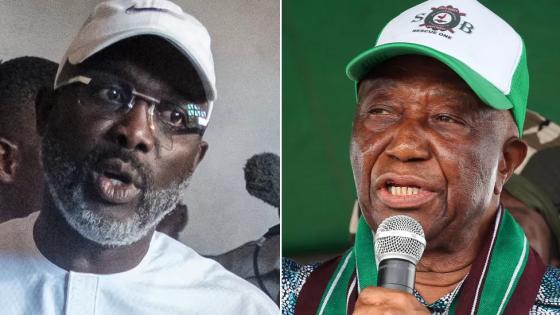Liberia: Boakai Leads, but Can He Defeat Pres. Weah?

— If Weah were to lose the election, it would mark a historic moment in Liberian politics, making him the first president in the nation's history to be denied a second term.
Former Vice President Joseph Boakai has taken a slim lead over President George Weah, the National Elections Commission disclosed as it began releasing results from the November 14 runoff election.
Boakai has secured a vote of 193,041, accounting for 50.71% of the tally, while President Weah closely follows with 187,615 votes, representing 49.29%, according to initial results released by the electoral body on November 15.
These figures encompass 22.33% of the tallied results from 1,315 polling places out of 5,890 nationwide. Both candidates are, however, performing relatively well in their respective strongholds, as they lead in seven counties, respectively.
However, results from Grand Kru, a traditional stronghold of President Weah, are yet to be announced, as Boakai is performing strongly in four out of the country's top vote-rich counties: Montserrado, Nimba, Margibi, and Lofa.
According to analysts, if the former Vice President can establish a compelling lead in these counties, it would strengthen his prospects for the presidency, as the vote share of these counties combined is larger than the others.
For Weah or Boakai to win, analysts noted it would depend on who performs better in areas traditionally loyal to their opponent.
If Weah were to lose the election, it would mark a historic moment in Liberian politics, making him the first president in the nation's history to be denied a second term.
Boakai, on the other hand, would become the second presidential candidate to return a former ruling party to power since 1878, when the True Whig Party achieved this feat.
A potential victory for Weah would also be groundbreaking, with him becoming the first candidate in Liberian history to defeat the same political opponent twice.
In the 2017 runoff, Weah secured a decisive win against Boakai, with a 61.5% to 38.5% margin in the runoff after winning the first round with a 10% margin. The dynamics have, however, shifted in 2023, with Boakai putting up a formidable fight in the first round, securing 43.44% of the vote compared to Weah's 43.83%. This razor-thin margin led to a runoff, as neither candidate reached the constitutional requirement of 50% plus one vote.
Voting data from the electoral body, however, shows widespread discontent with the Weah administration among Liberians, as 57% of the 1.9 million people that voted then did so for opposition candidates in the first round.
This, analysts noted, signals a significant shift in public sentiment about Weah, who came to power in 2017 riding on the promise to tackle corruption and improve livelihoods, for which he faced criticism for his failures to deliver on these commitments.
The President, in response, has cited external factors such as the coronavirus pandemic and the consequences of the Russia-Ukraine war for the economic challenges faced by his administration as he asked voters for more time to see the results of his first-term promises to root out corruption and improve livelihoods. He remains confident in his achievements, pointing to initiatives like the introduction of free tuition for university students as evidence of progress as a poll by Gallup, released hours ahead of the runoff elections on November 14, shows that just a slim majority of Liberians approve of the President's performance in his first term.
In the latest Gallup poll, conducted just before the October election, 54% approved of the president's job performance, down from 65% in 2022, making him somehow the favorite to retain power.
However, the Gallup poll revealed that 56% of Liberians felt that the standard of living in the country was getting worse, while 74% reported not having enough money for food in the past year and 32% felt safe walking alone at night in 2022, among the lowest in the world.
“The winner will likely be whomever Liberians think offers the best chance of combating a multitude of issues, including poverty, corruption, and safety concerns,” Gallup said.
Boakai, who framed his campaign on these issues as a “rescue mission”, said Liberia has become a declining state under Weah's administration, which he wants to rescue. He contested the runoff elections after securing the endorsement of three of the four best-performing candidates.
Elsewhere, the electoral body has warned the ruling Coalition for Democratic Change and the Unity Party that claiming victory and celebrating in the streets without waiting for the final election results is wrong and against the country’s election law.
The Commission noted that they are, however, expecting that the two parties will refrain from creating situations that will have the propensity to instill fear in the public.
